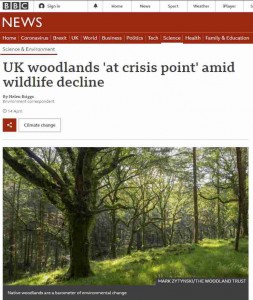A new report on the State of the UK’s Woods and Trees highlights that just 7 of Britain’s native woodlands are currently in good ecological condition
A new report has been published on the State of the UK’s Woods and Trees by the Woodland Trust (April 2021). Amongst other sources, this draws on technical data from the Forestry Commission’s National Forest Inventory Ecological Condition Survey. The headline being promoted is that just 7 of Britain’s native woodlands are currently in good ecological condition. This has interestingly been picked up by the national press and forms a major news story: https://www.bbc.co.uk/news/science-environment-56738428
Sylvan is delighted that the general public is being made aware of the plight of our woodlands. As our clients will know well, we have long bemoaned the poor ecological condition of the majority of our native woodlands, which can be due to a number of reasons, but most often is as a result of neglect. As demand for forest products faded away in the 20th century, so did the management of our woodlands. Unfortunately, by pure coincidence, it was this very management that just happened to be favourable for wildlife. At Sylvan, we remain frustrated that Natural England sets out that when assessing ancient woodlands, their ‘condition’ should not be taken into account. Might this approach by this statutory agency be contributing to the poor condition of some of our ancient woodlands?
Many of the proposals that Sylvan work on bring an opportunity to arrest and reverse the decline of both ancient and secondary woodlands and to restore these for the benefit of future generations. Given that ancient woodlands are classified as ‘irreplaceable habitat types’ afforded significant protection under planning policy, Sylvan continues to promote that the ecological and arboricultural benefits of the restoration of such woodlands are equally recognised and afforded significant positive weight in the planning balance.


